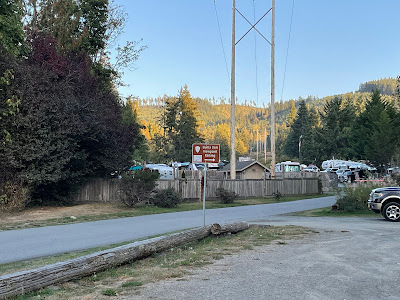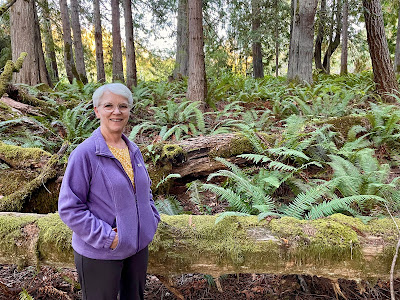Time to move from our location, again. This travel day took us from Gig Harbor, near the Seattle-Tacoma metropolitan area, to Port Angeles in a relatively remote part of Washington adjacent to Olympic National Park. If you don’t know where that is, it is in the northwestern corner and still near Puget Sound. It is closer to the Pacific Ocean than Gig Harbor. Our reason for getting here was twofold. The first was to make it to Victoria on Vancouver Island in British Columbia. The second was to spend some time exploring Olympic National Park.
Since it was a travel day, what we encountered was much like other travel days in the Pacific Northwest: Up and down changes in elevation of a couple hundred feet, lots of pine and spruce trees, and mountains. Byron estimated that over the 100-mile drive we had to go up and down more than two dozen times. Can you say “roller coaster?” There were also frequent turns like that of a coaster.
Our reservation was for Elwha Dam RV Resort, eight miles west of Port Angeles and a short distance from US 101. We arrived in the early part of the afternoon with enough time to go to the local Safeway for groceries and sticker shock. Even in Port Angeles, the cost of living is much higher than what we’ve been accustomed in Central Florida or Southern Indiana.
After returning from Safeway, we walked around the campground to learn more about Elwha Dam and the immediate area. The dam was on the river to facilitate a hydroelectric generating station. There was no salmon ladder built for the dam and the salmon stopped returning to the river. After two decades of study and deliberations, the decision was made to remove the dam and another since other sources of electricity were available. The 2011 decision was part of a National Park Service plan to restore the altered ecosystem of the area. About a year later, salmon started returning to the river and fishing soon followed. The ecology of the area was returning to what it had been a century earlier. Today, the Elwha River once again flows freely from its headwaters in the Olympic Mountains to the Strait of Juan de Fuca before going on to the Pacific Ocean.


No comments:
Post a Comment